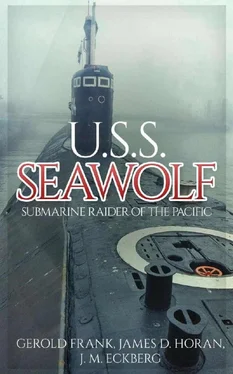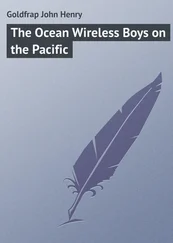“All they do,” he complained to me, “is throw their stuff in the machine and don’t give a damn how she looks when they leave her. I’ll knock the bastards’ heads off if I catch them.”
Swede was the only man who refused to use Baby. “The hell with her,” he said. “I’ll never wash my own clothes. It ain’t American.”
It was a nightly joke to see Swede pull out his “locker stick”—a long piece of wood used to pick soiled clothes out of a locker—and look through soiled shorts, shirts, and dungarees for a clean change. His locker was bursting, and yet he’d invariably dig out a new pair of shorts or a clean shirt.
“What did I tell you?” he’d chuckle. “Always one more.”
Captain Warder read and relaxed in his room. His desk was piled high with magazines and best sellers. Behind the green monk’s-cloth curtain his little stateroom was a model of neatness and efficiency, with a picture of his family—his wife and four youngsters—on the desk, his logs and papers neatly piled in place. He was finishing Van Loon’s Geography, reading the Naval Institute Proceedings , a navy magazine popular among officers, and The Army and Navy Register . He also had a copy of Wuthering Heights in his room. At night he’d join his officers—Deragon, Mercer, Syverson, and Holden—in a game of hearts in the wardroom. We always knew when he slipped the queen to one of his men. His booming, ringing laugh—he laughed infrequently, but it was loud and contagious when he did—would fill the tiny wardroom and echo in the passageway.
This routine, easy, without strain, went on for a week. We were sticking our nose into every cove, and inlet, and bay. The Captain was still ship-hungry. He wanted to come back with something. We’d just had too much bad luck so far.
On the fifth day we were proceeding submerged when the conning-tower officer spotted a patch of smoke. He called the Skipper, and both agreed it would be a race between the Wolf and darkness if we wanted to plunk her. Captain Warder had to be very cautious now. We were near the lower Philippines and had to watch for possible aircraft attack. He upped periscope now and then. Once he said:
“Damn it, there’s two of them. They’re both coal-burning tramps, merchantmen, high masts, high stacks, probably jumping from one island to another. They are not zigzagging. Both are old Marus… Battle stations!”
After a pause: “We’ll fire from the forward tubes. It’s getting dark here. Can you hear them yet?”
I searched. “Not yet, Captain.”
The approach party set to work. I had the heartbeat of the Jap screws. They were coal-burners, all right. Maley joined me. We wanted one of these babies badly. I began to call out bearings.
“Make ready the forward tubes,” came the Skipper’s voice. “Open the outer doors. Willie, I don’t know if I can fire on these or not, it’s so dark up here now. Has sound got them?”
Lieutenant Deragon said, “Bearings coming along satisfactory, sir.”
“Okay, Willie,” said the Skipper. “Take her from here.”
The Jap was close now. He was lumbering along at ten knots or so. It was only a matter of seconds before Lieutenant Deragon snapped:
“Fire one!”
Immediately we caught the high whine of the fish traveling hot and straight. I looked at my stopwatch to time them. I saw the seconds ticking away. Maley and I watched the fine thin hand slowly crawl around the face of the watch.
Captain Warder climbed down from the conning tower. He passed the sound room. One glance at his face, and we knew that, bad as we felt, he must feel worse.
“I’m going back to see Deragon, Paul,” I said. I found him sitting in the control room, toying with a pencil in his shirt and looking miserable.
“Were our bearings correct, Lieutenant?” I asked.
“You men were correct, Eck,” he said wearily. “We checked your bearings. I don’t know what could have gone wrong.”
I felt a little better. At least sound hadn’t been at fault.
That night the crew talked about the jinx. They had joked about it before, but now they didn’t know what to believe. Before I hit the sack I turned on the radio and heard that the Swordfish had taken a large toll of tankers and transports.
Three days out of port, I went topside. It was the first time for many days and nights. I climbed out on deck. The glare was blinding. It was like staring into a brilliant searchlight. I should have known better from my last experience, but I wanted to be up there. I buried my face in my hands. Pain stabbed at my eyeballs. I held onto the rail. I gulped the fresh air. For the first time I knew how exhausted I was.
Late that day I went up again. This time the glare wasn’t so bad. My eyes were becoming used to it. When the other men came up, I realized that the crew of the Wolf looked like men in a nightmare. These long patrols didn’t do us any good. Our faces were gray. Our lips were so dry that a few days later a plague of fever sores broke out among us. Our faces peeled. As before, ordinary daylight sunburned us.
Captain Warder, who had temporarily halted his setting-up exercises, was up on deck now, starting them all over again. I took a look at the bridge. The Wolf was as bedraggled as her crew. A blanket of slimy moss covered the deck. The chains were rusted and looked as though they hadn’t been used in years. The hawsers were soggy. They lay curled and decomposing under the deck. Where paint had chipped off, leaving the dull steel bare, the Wolf looked like a mangy dog. There were signs of where the garbage gang had tossed their nightly swill overboard. There were several places where the acid contents of the stuff had etched into the paint.
At one spot the aft portside was stove in—testimony to our nearly fatal depth charge. The memory of that moment was still vivid in my mind. Again I heard the awful thunderclap that seemed to tear my head apart; again I choked and gagged with the dust and cork.
As port grew closer, we went over the Wolf with cloth and polish. We wanted to bring her in spick and span. Magically she began to gleam again, though she still bore her scars. It would take more than polish to hide that wound in her side.
At the entrance to the mine field outside the Australian port, we were met by the U.S.S. Isabel . She brought us in alongside a tanker, and we fueled up. Mail came aboard, and for the next few minutes there wasn’t a sound throughout the boat.
Marjorie’s letters, answering those I’d written the last time I was here, awaited me. Everything was all right. She and Spike were O.K. She’d had pneumonia, she said, but she was all over it now. Not until later, much later, did I learn of the strange coincidence—the strange awareness we both had of each other that night she nearly died.
The following morning we were all called together, and the Skipper made a little speech.
“I don’t want any of you to feel that you have neglected your jobs or that you have let me down in any way on this patrol,” he said. “We made a tough cruise, and we had our share of tough luck. But don’t let that get you down. Remember, you’re the crew of the Seawolf . You can hold up your heads with anyone. I hope to be with you when we set out to sea again.”
We looked at each other. Was Captain Warder leaving us?
That, it appears, was his first inkling that he would soon be given another command—perhaps a more important command—in the future.
He continued: “And I want to say, ‘Well done and congratulations.’ Now go ashore and have a good time. That’s what I’m going to do.”
He turned to Lieutenant Deragon. “Anything else, Willie?”
Читать дальше






![Hubert Bancroft - The Native Races [of the Pacific states], Volume 5, Primitive History](/books/749157/hubert-bancroft-the-native-races-of-the-pacific-s-thumb.webp)

![Hubert Bancroft - The Native Races [of the Pacific states], Volume 1, Wild Tribes](/books/750126/hubert-bancroft-the-native-races-of-the-pacific-s-thumb.webp)



![Edward Ellis - Adrift on the Pacific - A Boys [sic] Story of the Sea and its Perils](/books/753342/edward-ellis-adrift-on-the-pacific-a-boys-sic-s-thumb.webp)